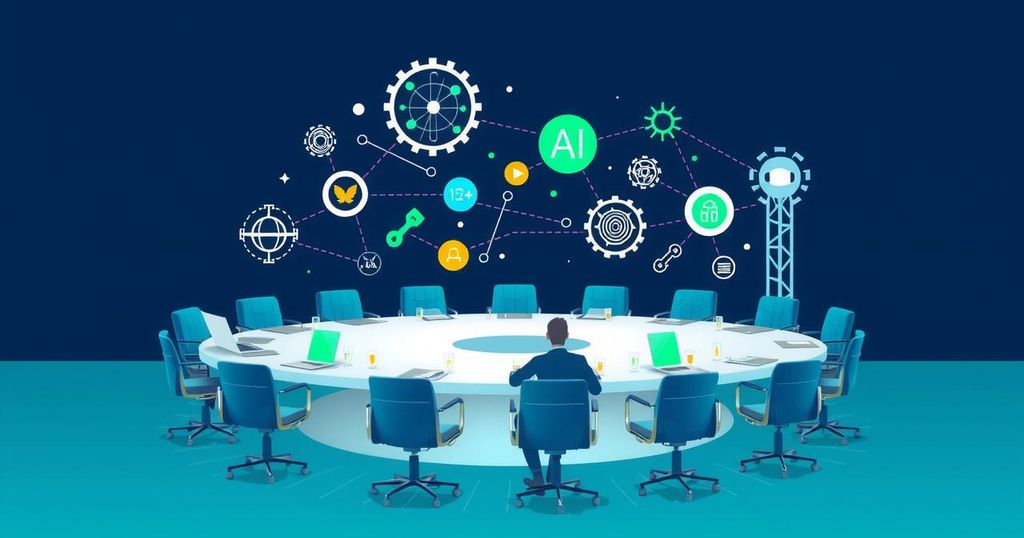Artificial Intelligence (AI) is significantly influencing Nigerian society, yet it raises concerns about cultural representation. Experts advocate for Nigeria to establish its own AI policies to ensure ethical standards and innovation. With AI reflecting its creators’ biases, Nigerian participation in ethical discussions is vital to prevent harmful consequences. By developing local solutions and engaging in global dialogues, Nigeria can shape AI to align with its values and address unique challenges.
Artificial Intelligence (AI) is deeply integrated into the daily lives of Nigerians, influencing social media feeds, voice assistants, loan approvals, and even the hiring process. Its impact is substantial, yet it raises pressing questions about the representation of Nigerian culture and values within these systems. The concern is whether the AI technologies being implemented reflect the unique realities of Nigerian society.
Scholarly articles by experts such as Dr. Desmond Eteh and Ugochukwu Akajiaku highlight the necessity for Nigeria to establish its own AI policies. Through their contributions in publications like Vanguard and The Punch, they underscore the imperative for a national AI policy to foster innovation and address critical issues such as climate action and environmental challenges.
AI, being a reflection of its creators, often embodies their values and biases. Given that current dominant AI models originate primarily from the United States, China, and Europe, it is questionable whether these systems can adequately meet the needs of Nigerians. Active engagement in AI ethics by Nigeria is crucial to avoid becoming mere consumers of technologies that may not align with local cultural norms.
The inherent biases in AI systems can lead to significant challenges, particularly within financial services and hiring processes, where historical data often disadvantages certain demographics. If Nigeria does not participate in defining ethical AI frameworks, it risks receiving technologies that may further entrench existing inequalities instead of resolving them.
As Nigeria embraces AI in various sectors, the absence of a robust ethical foundation poses risks such as biased hiring decisions and healthcare misdiagnosis. To mitigate these risks, Nigeria must formulate its own AI ethics regulations similar to those established by global powers such as the European Union, ensuring that AI deployment is fair and accountable.
Moreover, the development of African-centric AI solutions is essential. By cultivating local talent and addressing the unique challenges of Nigerian society, AI can become more effective and inclusive. Government investment in educational institutions and tech startups can foster innovation that specifically addresses regional needs.
Nigeria’s representation in global AI dialogues is equally important. Actively participating in international AI ethics discussions and frameworks will help ensure that African perspectives are considered in technology development. If Nigeria is not involved, it risks living with the outcomes of external decisions that may overlook local contexts.
Engaging the public in discussions around AI ethics is critical to fostering awareness and understanding. By incorporating AI education into school curricula and encouraging public discourse through tech hubs, Nigeria can cultivate a knowledgeable populace that advocates for ethical practices in AI utilization.
In conclusion, the ethics of AI is a pressing global concern that demands Nigeria’s immediate attention. With a thriving tech ecosystem, Nigeria has the potential to shape its AI landscape. By prioritizing regulation, investment in local solutions, and active global participation, Nigeria can ensure that AI serves as a force for progress rather than an instrument of inequality. The country’s decisions today will significantly shape the role of AI in society going forward.
In summary, Nigeria’s engagement in AI ethics is crucial for ensuring that technologies align with local values and needs. Establishing robust AI regulations, investing in indigenous solutions, participating in global discussions, and educating the public are vital steps toward shaping a future where AI serves as a beneficial tool for progress. The choices made today will have lasting impacts on the integration of AI in Nigerian society, emphasizing the importance of proactive involvement in the technology’s ethical development.
Original Source: tribuneonlineng.com




